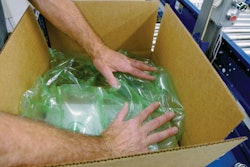I have often discussed how the general public perceives packaging, noting the many “wrap rage” websites and militant discussions of over packaging and crowded land fills.
Another area under continued fire is the functional/health food claims on labels. Columnist Julie Deardorff, writing for the Oklahoma news website, NewsOK, takes on health labeling claims and suggests consumers avoid all packaged goods making any kind of claim.
“Ice cream snacks brag about having '0 grams trans fat,' but a serving contains about 20 grams of saturated fat — a whole day’s worth.”
“And a ‘vitamin-enhanced drink mix’ claims that its vitamins A, C and E will help 'maintain a healthy immune system,' though there is no scientific evidence for the claim.”
The FDA first banned health claims on foods back in 1906. At that time, many food and beverage products were being hawked like patent medicines. Deardorff quotes Michael Pollan’s best-seller, “In Defense of Food”—Grape Nuts were advertised as "a cure for tuberculosis, malaria, and appendicitis!"
In the 1980’s food companies again started targeting the health-conscious consumer. The FDA answered a decade later calling for “science-based” claims. Deardorff writes that the industry has lobbied for looser rules and continues to push the limits on the rules.
Recently the FDA began cracking down, most notably slapping Cheerios for “serious violations” claiming the label on the General Mill’s brand actually makes Cheerios an unapproved drug.
Can the understaffed and seriously strained FDA police the functional food market? Will the food and beverage producers police themselves? Will the public be the ultimate judge?
Here is one Oklahoma columnist telling consumers to gravitate to the produce aisle where the real healthy products reside.
Get your daily dose of global packaging trends on Twitter.
Another area under continued fire is the functional/health food claims on labels. Columnist Julie Deardorff, writing for the Oklahoma news website, NewsOK, takes on health labeling claims and suggests consumers avoid all packaged goods making any kind of claim.
“Ice cream snacks brag about having '0 grams trans fat,' but a serving contains about 20 grams of saturated fat — a whole day’s worth.”
“And a ‘vitamin-enhanced drink mix’ claims that its vitamins A, C and E will help 'maintain a healthy immune system,' though there is no scientific evidence for the claim.”
The FDA first banned health claims on foods back in 1906. At that time, many food and beverage products were being hawked like patent medicines. Deardorff quotes Michael Pollan’s best-seller, “In Defense of Food”—Grape Nuts were advertised as "a cure for tuberculosis, malaria, and appendicitis!"
In the 1980’s food companies again started targeting the health-conscious consumer. The FDA answered a decade later calling for “science-based” claims. Deardorff writes that the industry has lobbied for looser rules and continues to push the limits on the rules.
Recently the FDA began cracking down, most notably slapping Cheerios for “serious violations” claiming the label on the General Mill’s brand actually makes Cheerios an unapproved drug.
Can the understaffed and seriously strained FDA police the functional food market? Will the food and beverage producers police themselves? Will the public be the ultimate judge?
Here is one Oklahoma columnist telling consumers to gravitate to the produce aisle where the real healthy products reside.
Get your daily dose of global packaging trends on Twitter.
























